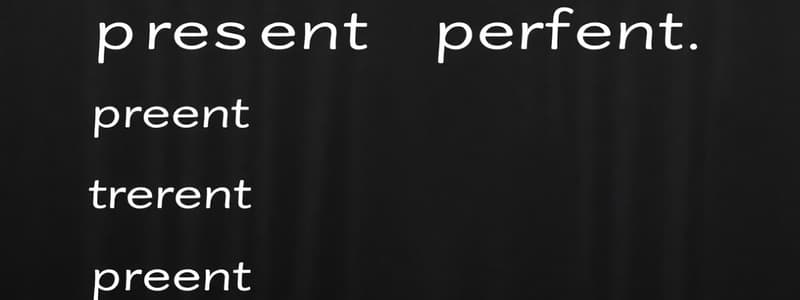Podcast
Questions and Answers
What is the correct structure of a sentence in the present perfect continuous tense?
What is the correct structure of a sentence in the present perfect continuous tense?
- Subject + was/were + verb-ed
- Subject + has/have + verb-ed
- Subject + has/have + been + verb-ing (correct)
- Subject + is/are + verb-ing
Which of the following time expressions is commonly used with the present perfect continuous tense?
Which of the following time expressions is commonly used with the present perfect continuous tense?
- Completed
- Often
- Yesterday
- For (correct)
How does the present perfect tense differ from the present perfect continuous tense?
How does the present perfect tense differ from the present perfect continuous tense?
- Present perfect can only be used in negative sentences, while present perfect continuous cannot.
- Present perfect is used with non-continuous verbs, while present perfect continuous is not.
- Present perfect continuous emphasizes the number of actions, while present perfect does not.
- Present perfect focuses on completion, while present perfect continuous focuses on ongoing actions. (correct)
Which of the following sentences correctly uses the present perfect continuous tense?
Which of the following sentences correctly uses the present perfect continuous tense?
What common mistake is associated with present perfect continuous tense?
What common mistake is associated with present perfect continuous tense?
What does the present perfect continuous tense primarily emphasize?
What does the present perfect continuous tense primarily emphasize?
Which of the following best describes a scenario for using the present perfect continuous tense?
Which of the following best describes a scenario for using the present perfect continuous tense?
Which sentence correctly uses the negative form of present perfect continuous tense?
Which sentence correctly uses the negative form of present perfect continuous tense?
In which scenario would the present perfect continuous tense be used for recent actions with present relevance?
In which scenario would the present perfect continuous tense be used for recent actions with present relevance?
How is the present perfect continuous tense structured in its affirmative form?
How is the present perfect continuous tense structured in its affirmative form?
Which of the following time expressions is NOT commonly used with the present perfect continuous tense?
Which of the following time expressions is NOT commonly used with the present perfect continuous tense?
What is a common mistake associated with present perfect continuous tense?
What is a common mistake associated with present perfect continuous tense?
Which of the following sentences best illustrates a temporary activity using the present perfect continuous tense?
Which of the following sentences best illustrates a temporary activity using the present perfect continuous tense?
Which of the following best characterizes actions described by the present perfect continuous tense?
Which of the following best characterizes actions described by the present perfect continuous tense?
Flashcards are hidden until you start studying
Study Notes
Present Perfect Continuous
Usage Rules
-
Form: Subject + has/have + been + verb-ing
- Example: She has been studying.
-
Duration Focus: Emphasizes the duration or continuous nature of an action that started in the past and is still ongoing or has recently stopped.
-
Recent Activity: Indicates a recent action that has consequences or relevance to the present moment.
- Example: He has been running, so he is tired.
Time Expressions
- Commonly used with:
- Duration phrases: "for," "since"
- Example: I have been working here for five years.
- Example: They have been living in Paris since 2020.
- Non-specific time references: "lately," "recently"
- Example: It has been raining lately.
- Duration phrases: "for," "since"
Differences From Present Perfect
-
Present Perfect:
- Used for actions without emphasis on duration or continuity.
- Example: She has finished her homework. (Focus on completion)
-
Present Perfect Continuous:
- Used for actions that are ongoing or have recently stopped and focuses on the duration.
- Example: She has been finishing her homework. (Focus on the process)
Common Mistakes
-
Redundant Usage: Avoid using it when the duration is not relevant.
- Incorrect: They have been visiting Paris last summer.
- Correct: They visited Paris last summer.
-
Confusing with Simple Tenses: Do not mix up with the simple present or present perfect tense.
- Incorrect: I am studying for three hours. (should be I have been studying for three hours.)
-
Using Wrong Time Expressions: Ensure appropriate time expressions are used.
- Incorrect: I have been here yesterday.
- Correct: I was here yesterday.
-
Using Non-continuous Verbs: Present perfect continuous cannot be used with stative verbs (e.g., know, love, like).
- Incorrect: I have been knowing him for years.
- Correct: I have known him for years.
Present Perfect Continuous
- Form: Subject + has/have + been + verb-ing
- Example: She has been studying.
- Duration Focus: Emphasizes how long an action has been happening, starting in the past and continuing or recently stopping.
- Recent Activity: Indicates a recent action with consequences or relevance to the present.
- Example: He has been running, so he is tired.
Time Expressions
- Commonly used with:
- Duration phrases: "for," "since"
- Example: I have been working here for five years.
- Example: They have been living in Paris since 2020.
- Non-specific time references: "lately," "recently"
- Example: It has been raining lately.
- Duration phrases: "for," "since"
Differences From Present Perfect
- Present Perfect:
- Used for actions without emphasis on duration or continuity.
- Example: She has finished her homework. (Focus on completion)
- Present Perfect Continuous:
- Used for actions that are ongoing or have recently stopped and focuses on the duration.
- Example: She has been finishing her homework. (Focus on the process)
Common Mistakes
- Redundant Usage: Avoid using it when the duration is not relevant.
- Incorrect: They have been visiting Paris last summer.
- Correct: They visited Paris last summer.
- Confusing with Simple Tenses: Do not mix it up with the simple present or present perfect tense.
- Incorrect: I am studying for three hours. (should be I have been studying for three hours.)
- Using Wrong Time Expressions: Ensure appropriate time expressions are used.
- Incorrect: I have been here yesterday.
- Correct: I was here yesterday.
- Using Non-continuous Verbs: Present perfect continuous cannot be used with stative verbs (e.g., know, love, like).
- Incorrect: I have been knowing him for years.
- Correct: I have known him for years.
Present Perfect Continuous
- Indicates actions that started in the past and continue into the present, or have recently stopped.
- Emphasizes the duration or ongoing nature of the action.
- Uses "has/have been + verb-ing" structure.
- Expresses the actions that are still being carried out or have just finished.
- Emphasizes how long an action has been ongoing.
- Often used with time durations like "for" (e.g., for two years) and "since" (e.g., since 2020).
- Can be used to describe actions that have effects in the present.
- Useful to express temporary activities or situations.
- Focuses on the duration or continuity of an action.
- Often used when the action is unfinished or still continuing.
- Can convey a sense of effort or repetition.
- Avoid confusion with the simple present or present perfect.
- Generally not used in passive sentences.
Studying That Suits You
Use AI to generate personalized quizzes and flashcards to suit your learning preferences.




